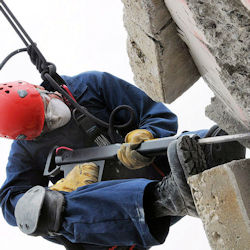Vibration
Segmental Vibration
When handling vibrating tools for a prolonged duration, vascular insufficiency in the hand and fingers can also result in interference with sensory receptor feedback.
If a worker can't "feel" the grip properly, he or she may compensate by applying more force than is necessary to hold and handle an object.
Segmental vibration has also been linked to carpal tunnel syndrome.
Whole Body Vibration
When the whole body is subjected to vibration, as most commonly experienced by truck drivers, there is an enhanced risk of injury, especially to the lower back.
Whole-Body Vibration usually results from two types of forces acting on the worker.
- A non-cyclical force over a very short period of time (instantaneous shock load). A vehicle striking an obstacle or a sudden drop into a hole may produce these shock loads. If these shock loads are sufficiently great, the operator may be thrown from his seat or struck by objects flying around in the cab.
- The most common whole-body vibration forces are not sudden, but rather occur over a period of time. For example, this type of vibration is usually created by large vehicles as they travel over highways and especially terrain.
Duration of exposure plays a large role in the effects of vibration forces. Vibration forces delivered over time are more difficult to define than the instantaneous damage caused by high shock loads. The body will respond significantly to vibrations in the range of .5 to 80 Hz (Hertz, cycles/second). The body's response to vertical vibration will be greatest between 4 and 8 Hz, while vibrations between 2.5 and 5 Hz generate strong resonance in the vertebra of the neck and lumbar region. Prolonged exposure to these vibration forces in these frequency ranges may create chronic stresses and sometimes even permanent damage to the affected organs or body parts.
Knowledge Check Choose the best answer for the question.
3-5. The most common whole-body vibration forces occur _____.
You forgot to answer the question!


